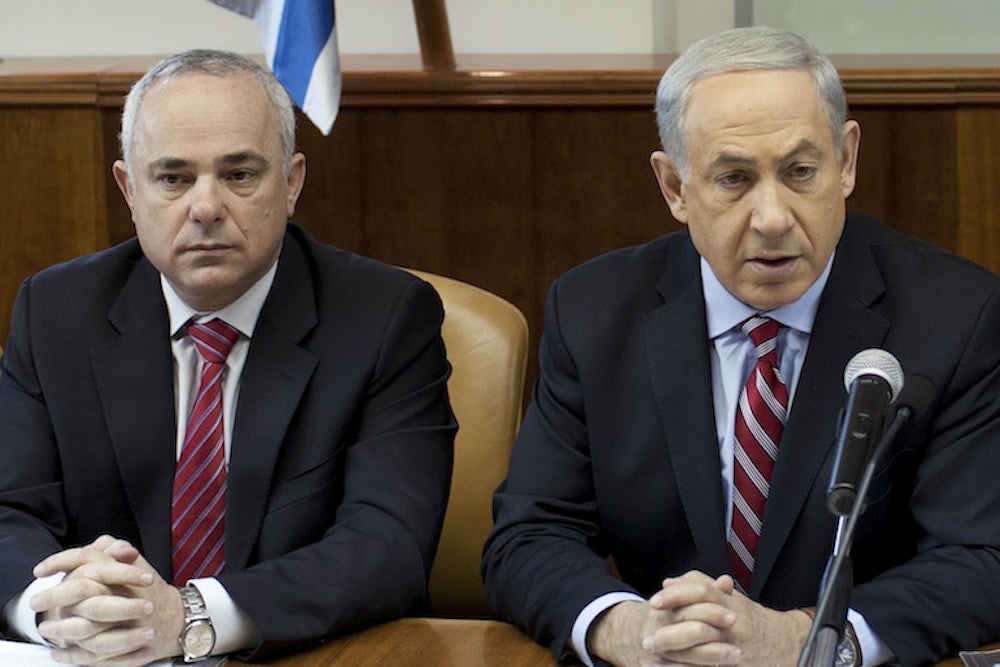With the ink barely dry on the interim nuclear deal signed Sunday between Iran and six world powers in Geneva, there's already a battle to define it. President Obama called the six-month pact “an important first step toward a comprehensive solution.” Israeli Prime Minister Benjamin Netanyahu—echoed by some congressional Republicans—called it a “historic mistake” in his weekly cabinet meeting.
Who is right? The answer depends on what one is comparing the deal to.
Compared to the ideal no-enrichment deal sought by Israel and the Gulf states—nay, compared to Iran’s obligations under U.N. Security Council resolutions—Geneva was indeed a lousy deal. The six-month agreement does not oblige Iran to suspend all domestic uranium enrichment, offering de-facto recognition of the dubious right that Iran has been claiming under international law. Iran will also get economic relief to the tune of $6-7 billion in unfrozen assets and relaxation of sanctions on precious metals, refined-oil products, and automobile and aircraft parts. As many have pointed out, the improvement to the Iranian economy is likely to be far greater, as the expectation of future sanctions relief changes the psychology of outside investors.
But a more useful way to evaluate the Geneva deal is to compare it to a scenario in which the talks produced nothing. From this perspective, the deal is a clear victory, even for Israel.
Before Geneva, Iran was steadily increasing its number of centrifuges and installing new, advanced ones. The steady increase over recent years had shortened the breakout period—that is, the time it would take Iran to produce enough weapons-grade uranium for a bomb—to as little as six weeks. By barring the introduction of new centrifuges and placing limits on the existing ones, the deal will lengthen the breakout period by 1-2 months.
Before Geneva, Iran had amassed 196 kilograms of uranium enriched to 20 percent—just shy of the 240 kilograms that Netanyahu had declared his red line last September at the U.N. General Assembly. Now it will be forced to cease enrichment above 5 percent and to dilute its 20-percent stock to below that level or convert it into forms from which it will be difficult to turn it into weapons-grade uranium.
Before Geneva, Iran was continuing construction of the Arak heavy-water reactor, which would produce plutonium—another potential bomb fuel—and thereby offer Iran a second route to a nuclear weapon (and one that would be essentially immune to attack given the massive civilian casualties that attacking the reactor would cause). The agreement’s halt to most aspects of construction, reportedly inserted at the insistence of the French, postpones that day of reckoning.
Before Geneva, international inspectors were able to inspect Iran’s uranium enrichment facilities once every two weeks. Now they will be given daily access.
Between the ramped-up inspections and the lengthened breakout period, it would be diplomatic suicide for Iran to attempt a dash for a nuclear weapon anytime in the near future, much less the coming six months. In other words, the international community has little to lose by testing Iran’s intentions during this interim period.
“If this were the final agreement, then it would be a really bad agreement, but that’s not the situation,” former Israeli defense-intelligence chief Amos Yadlin told reporters Sunday, offering a cautious endorsement. As he did with me in an extensive interview last month, Yadlin reiterated his contention that a successful final deal would take the Iranian breakout period from the couple of months it is now to two years.
The question is whether the current deal makes such an outcome more or less likely.
The limits Iran accepted in return for modest sanctions relief suggest that Iran would offer far more significant concessions in return for an end to the oil and central-bank sanctions that have crippled its economy. (Though President Obama trumpeted his achievements on the sanctions front on Sunday, it is worth noting that his administration initially opposed to the latter.) And if the current deal strengthens Iranian President Hassan Rouhani’s hand domestically, it could give him the leeway necessary to make the further-reaching concessions necessary for such a deal. But, of course, the sanctions relief could have the opposite effect, sapping the urgency and incentive for Iran to compromise on what has become a symbol of national pride. One thing is for certain: At least for the next six months, the Israeli military option has been put in deep freeze, though it could return with a vengeance if talks on a comprehensive deal fail.
I wrote a couple weeks ago that Netanyahu was probably reconsidering his previous decisions not to strike Iran at a time when Ahmadinejad was still the face of the Iranian regime and when Barack Obama was still concerned with re-election. But it is worth considering where Israel would be had Netanyahu gotten his way in 2010, when his cabinet first seriously debated a strike on Iran. As Ha’aretz’s Amir Oren rightly put it, “if Netanyahu and Barack’s plans between spring 2010 and spring 2011 had succeeded, Israel would now be dealing with the wounds of the first Iranian war and preparing for the second, while Iran’s efforts to build a nuclear bomb would be about to finish.”
Another top Israeli security figure recently noted to me that if the deal taking shape in Geneva were to forestall a nuclear-armed Iran for a couple of years, it would be almost as effective as an Israeli military strike—with none of the consequences, of course. Compared to the current situation, the Geneva deal does not clear that bar. But compared to where the Iranian program would be six months from now without a deal, it could come close.
Ben Birnbaum is a writer living in Israel. Follow him @Ben_Birnbaum and on Facebook.
Correction: A previous version of this article stated that the deal will lengthen the breakout period "to" 1-2 months. It will lengthen the period by 1-2 months.
